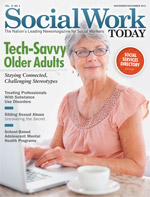|
Redefining Aging Aging is one of life’s most predictable events, yet exploring this subject is too often absent from personal and professional conversations because speaking about aging and the end of life often awakens the reality of mortality and debilitation. Also, social attitudes can sometimes work to devalue, disregard, and ultimately silence the aging experience, leaving older adults feeling diminished and isolated. But the stereotypes of older adults being unattractive, wrinkled, impaired, disinterested, disgruntled, and one step away from death can be reversed or reframed. The elder years can be compatible with vibrancy, with late life still being full of continued productivity, connectedness, emotional resilience, and wisdom. Revising the Older Adult Image Although these results inspire optimism, how will these changes affect the average older adult’s view of themselves? No one can better redefine the aging experience than older adults themselves—the real experts. Older adults can replace previous stereotypes with their own realistic experience-based description of what matters to them now. This optimism inspired the development of an original mental health intervention for typical problems of aging for elders over the age of 70. Forming an Older Adult Peer Group The group is based on a topic-centered questionnaire for facilitators that was developed over five years’ worth of group meetings. Each topic contains questions related to central issues about the aging experience. The topics are formidable, eliciting reflective, meaningful responses. Members have enthusiastically endorsed this questionnaire-based method because it has helped them feel that their definition of their life experiences is being taken seriously. They also feel that having a leader/facilitator is necessary for focus. The group mood has been dedicated, eager, and committed. The members are wading into deep emotional territory: illness, regrets, lost opportunities, family disputes, sexuality, and death. Group Discussions The following are some of the questions posed during the group sessions: • Do you feel your age? • What makes you feel necessary and vibrant? • What does it take to adapt to the inevitable transitions that aging requires? • Does your stage of life affect the way people react to you? • Have you needed to curtail certain activities due to decreased energy or health problems? • Do you feel recognized, regarded, useful, and necessary now? Unearthing Painful Feelings A peer group such as this one, different from bridge and bingo, can provoke initial reluctance. It may be the first time elders reveal thoughts, attitudes, and memories that are important to them. Having others listen to, understand, and respect their thoughts can be a novel experience. Bearing witness to peers talking about similar life struggles eases the transition into talking. Painful topics do come up in a group. Members fear they may not be around to experience important life events. They are apprehensive about possibly needing more help as they age. They are dismayed if they have an extended recovery from illness. Unearthing these thoughts can leave them feeling disheartened, disturbed, and disappointed. As the group members gradually become aware of the consequences of aging, they begin opening up to talking and listening to this type of discussion. The group setting among people at this stage of life eases the pain and disappointment and diminishes the amount of discomfort involved. It gradually works to immunize people to their initial trepidations. As the group progresses, the members appreciate being taken seriously and being accepted, admired, liked, and included. The social interaction provides them with validation, empathy, and support in a congenial environment. The inevitable risks and hazards of aging become apparent. This helps older adults become more realistic when adopting coping skills for the future. Considering serious topics and discussing them exercises the mind, moves individuals from one stage to another in life, and reaffirms a sense of personal identity. Extending Use of the Model A comment from a group member expresses the value of this kind of group interaction: “We may randomly think of these serious issues on our own, but after discussing them together as a group, when these issues come up again in our minds, we hear them and think about them differently.” — Wendy A. Wilson, LCSW, who has practiced psychotherapy for 35 years, was an adjunct faculty member at Adelphi University School of Social Work in Garden City, NY, and is a national presenter on issues facing older adults.
|

 November/December 2012 Issue
November/December 2012 Issue